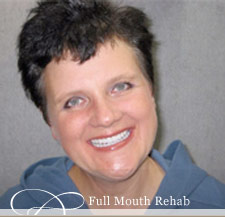Your bite can be a factor in many types of pain and functional problems because of the inter-relationships of the overall musculoskeletal system. Through new technology, we can evaluate your bite and determine if it is a major contributing factor to your condition. Dr. Ania will thoroughly discuss treatment options with you, which could include a referral to an orthodontist, otolaryngologist (ear, nose, and throat specialist), oral surgeon, or others.
What is the difference between TMJ and TMD?
TMJ stands for temporomandibular joint and saying that you have “TMJ” is like saying you have KJ (knee joint) or EJ (elbow joint).
While the term TMJ is reflective of the early belief that these disorders largely originated in the joint itself, more recent knowledge has shown that the true cause of joint problems often lies elsewhere. That, combined with the fact that the term TMJ is not really descriptive of a disorder, has led to today’s more common use of the term TMD, which stands for temporomandibular disorder.
While the latter is the most common term in use today, you may also hear these conditions referred to as craniomandibular disorders(CMD), craniofacial pain disorders (CPD), temporomandibular dysfunction, or the still-used catchall term TMJ.

What is neuromuscular dentistry?
When the harmony of the teeth, muscles, and temporomandibular joint no longer exists, symptoms of what has been identified as TMJ/TMD arises. Neuromuscular dentistry focuses on the dynamic relationships related to the physiologic range of motion and body posture. Physiologic resting position and body posture are often overlooked, yet must be considered as an important part of the whole dental system.
What are the signs & symptoms of TMD?
Damage to these joints as a result of accidents or arthritis can be quite obvious. As other pain conditions of the head and neck began to be associated with this joint, the term TMJ was coined to collectively describe them.
The many signs and symptoms of TMD often lead the patient to a physician prior to seeking dental consultation including:
• Headaches
• Jaw joint pain or noise
• Limited mouth-opening
• Ear congestion
• Dizziness
• Clenching or grinding
• Neck pain
• Teeth sensitivity
• Insomnia

What TMD treatment options are available?
Treatments in the past frequently focused on the joint itself and often involved invasive procedures directly within the joint or even surgical replacement of the joint. Confronted with these symptoms, the medical profession often treats these conditions with anti-inflammatory drug, pain medication or tranquilizers.
Dentistry is still not in consensus on the causes and treatment of TMD, however the profession does largely agree that the condition should be treated in the most conservative manner (surgery is a last resort) and without drugs whenever possible. Drugs can often mask the symptoms, do not treat the underlying cause, and may have severe side effects.
How can a dentist treat TMD?
With growing technological advances, new means of evaluation TMD patients has given dentists additional information to expand their diagnostic capability. Those using these new techniques feel stronger than ever that the primary problem can often be traced to a poor occlusion (bit) than to the joint itself. Joint problems are frequently related to a misalignment of the teeth (malocclusion), which in turn causes a misaligned joint. Misalignment of joints is often resolved as a result of correcting a malocclusion.
Schedule A TMD Treatment Consultation with Dr. Ania
Contact Dr. Ania today to set up a TMD treatment consultation. She can evaluate your bite to determine if TMD is contributing to your condition and suggest treatment options to fit your needs. Call our Boulder office at 303-443-0998 or request an appointment online to get started.
TMD FAQs
What causes TMD?
TMD can be caused by a variety of factors, including but not limited to jaw injuries, arthritis, genetic predisposition, excessive gum chewing, poor posture, stress, and teeth grinding (bruxism). Determining the exact cause of TMD is crucial for effective treatment and is part of the diagnostic process at our clinic.
How does Dr. Ania diagnose TMD?
At our dental office, Dr. Ania uses a comprehensive approach to diagnose TMD. This includes a detailed analysis of your medical history, a physical examination of your jaw and face, imaging tests like X-rays or MRIs if necessary, and sometimes dental impressions to assess how your teeth come together. This thorough diagnostic process helps to pinpoint the specific type of TMD, which then allows Dr. Ania to devise an appropriate treatment plan.
Are there any home remedies or self-care tips for managing TMD symptoms?
Yes, there are several self-care practices that can help manage the symptoms of TMD:
- Eat Soft Foods: Soft or blended foods can reduce the strain on your jaw.
- Avoid Extreme Jaw Movements: Limit wide yawning, loud singing, and chewing gum to decrease stress on the joints.
- Apply Ice or Heat: Ice packs can reduce inflammation, while heat packs can help relax the muscles and improve blood flow.
- Gentle Jaw Exercises: Gentle stretching and relaxing exercises can help increase jaw mobility and decrease pain.
- Practice Good Posture: Keep your neck straight and your shoulders back to reduce neck and jaw strain.
However, the more severe your case of TMD is, the more likely you are to need treatment to attain relief.
How long does it take to see improvements after starting treatment for TMD?
The duration before noticeable improvements can vary depending on the severity of the condition and the treatment approach. Some patients experience relief after a few weeks of conservative treatment, such as medication and physical therapy, while others may require longer periods if more intensive treatments like occlusal adjustments or surgery are necessary. Dr. Ania will monitor your progress closely and adjust treatments as needed to optimize your recovery.
What should I do if I suspect I have TMD?
If you suspect you have TMD, it is important to seek professional advice. Avoid self-diagnosing as it might lead to inappropriate treatments that could exacerbate the problem. Schedule an appointment with Dr. Ania, who will evaluate your symptoms and recommend the most effective treatment options for your specific condition.
Is TMD treatment covered by insurance?
Coverage for TMD treatment varies widely between insurance providers and plans. Our clinic staff is experienced in dealing with insurance queries and can help you understand your coverage details. We recommend contacting your insurance provider directly to confirm what treatments are covered under your plan. Additionally, our clinic can provide necessary documentation and support to assist with your insurance claims.
Why should you choose Dr. Ania for TMD treatment?
Dr. Ania is a highly skilled specialist with extensive experience in diagnosing and treating various temporomandibular disorders. Her approach is patient-centered, focusing on individualized care and comprehensive treatment plans. She utilizes the latest diagnostic tools and treatment techniques to ensure the best possible outcomes. Furthermore, Dr. Ania is committed to ongoing education and research in the field of TMD, keeping up-to-date with the latest advancements to offer cutting-edge care to her patients.
Call (303) 443-0998 to schedule an appointment with Dr. Ania in Boulder, CO.
